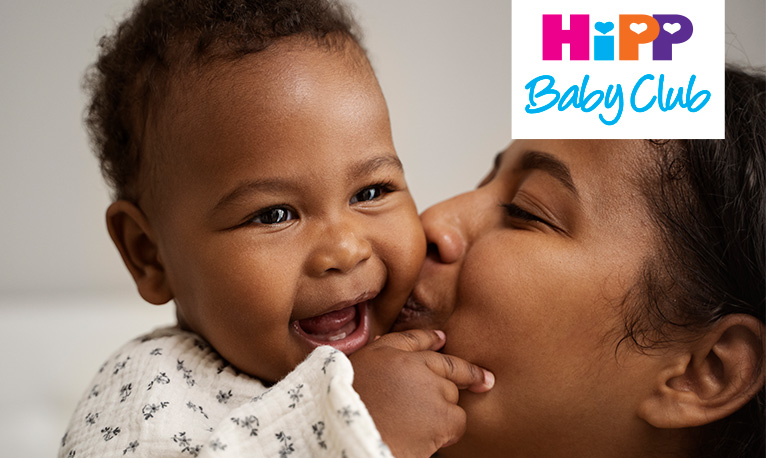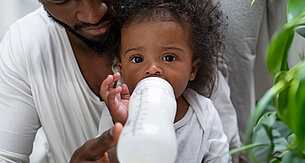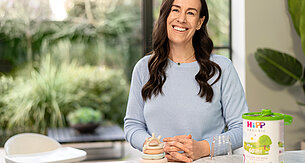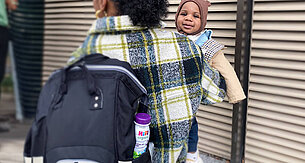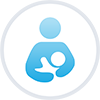Travelling with a bottle-fed baby: a few things to keep in mind when planning your first adventure with your little one
Heading off to enjoy the sunshine abroad? Lucky you!
In between packing the sunblock and finding the passports, however, you might also have a concern or two about how to handle travelling with a bottle-fed baby. Rest easy, we're here to help!
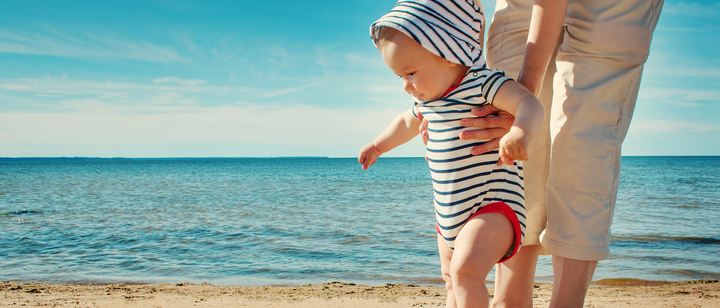
Here are our top travel tips for formula feeders.
- If you're flying, there's some good news: the 100ml carry-on limit for liquids doesn't apply to formula milk or sterilised water. This means you can bring a reasonable amount of each to meet your baby's needs for the journey. We'd suggest packing several bottles with pre-measured amounts of formula powder, plus bottles of cooled, boiled water (not in a vacuum flask, as this might cause problems at security) to make up the formula en route. If you ask nicely, flight attendants should be happy to pop the bottle into some hot water to warm it up for you (but remember that the water should be at least 70 degrees C for preparing powdered formula feeds, so a thermometer would be helpful to check this).
- Alternatively, you can wait until you've gone through security and purchase ready-to-drink baby formula at an airport chemist; most UK airports, including Gatwick and Heathrow, will even let you reserve some in advance for your journey. This is a far more convenient option.
- Remember to pack or buy enough formula to cope with any flight delays you might encounter – they're bad enough without adding a hungry baby to the mix!
- During your flight, you might want to also offer your baby occasional drinks of cooled, boiled water; the dry atmosphere on an airplane is very dehydrating, and it can affect babies much more quickly than adults.
Once you've arrived, there are a few things to remember before you and your baby hit the beach or the pool.
- First, the tap water abroad may not be suitable for drinking, and even if you boil it, it might well have different levels of minerals than your baby is used to at home. To avoid a tummy upset, you'll probably want to make up formula using bottled water instead (and yes, it still needs to be boiled and cooled first!) Look for a brand with less than 200 mg of sodium (Na) and less than 250 mg of sulphate (SO or SO4) per litre. Most bottled waters have significantly less sodium than 200mg/litre and choosing a water with a level of 20mg Na/litre or less would ensure that a made up infant formula is closer in sodium composition to breastmilk.
- Bottles and teats still need to be sterilised, too , of course, but this needn't mean lugging along your electric steriliser; try using cold-water sterilising tablets instead, or if you'll have access to a microwave, bring along a compact microwave steriliser. If you're into more minimalist travel, you could always opt for disposable, pre-sterilised bottle liners and teats.
- If you're travelling in Europe, you might see your brand of formula in the local shop, but given each country's individual food regulations, it can be a tricky business to detect whether that familiar container actually holds the same powder as it does at home. Your safest bet is to pack enough formula powder for your entire trip in your hold baggage, plus a bit extra. (This isn't a bad thing; remember you can use the extra space on the way home to fit in all your holiday shopping bargains!)
- If you're heading off for the day, pack several pre-measured “dry” bottles, plus a vacuum flask of just-boiled water. The water should stay hot for several hours, which will let you easily make up a nice warm bottle during your travels.
- If it's going to be hot where you're going, keep in mind that babies can become dehydrated much more quickly than adults. Offering a bottle of cooled, boiled water in between feeds,or if appropriate a cup, will help keep your little one happy and healthy.
Got any other genius travel tips to share? We'd love to hear them! Share your views on Facebook.

